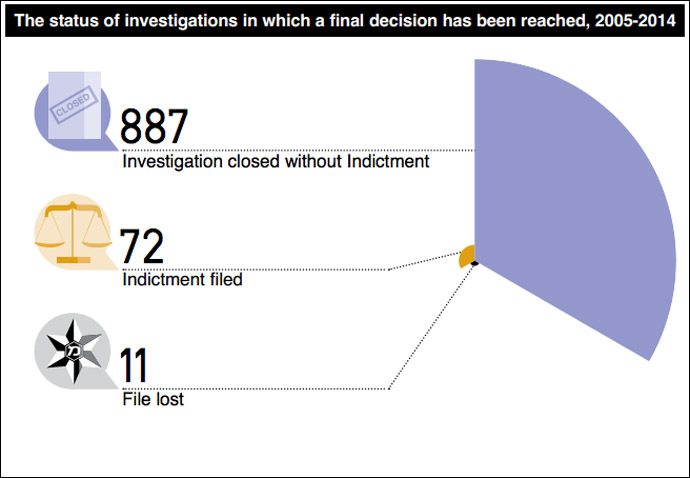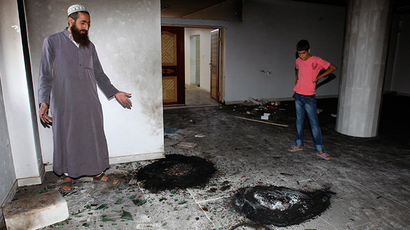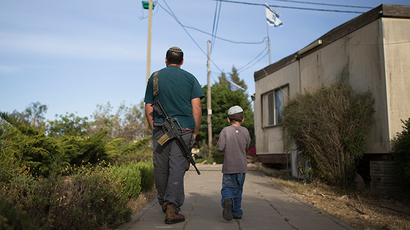Vast majority of Israeli-on-Palestinian crime claims routinely unsolved – rights group

Israeli police have proven vastly inept at solving reported crimes against the Palestinian population: a staggering 92 percent of complaints end up closed with no justice served, according to the Yesh Din human rights group.
The organization, which also took part in assisting many of the victims, oversaw the status of some 1,045 complaints filed to the Samaria & Judea (SJ) District Police in the period between 2005 and 2014, and came to the conclusion that only 7.4 percent had actually led to criminals being caught – 1 percent less than in previous reports.
All of the complaints had to do with Israeli civilians suspected of attacking Palestinians and their property. They include shootings, assault and battery, arson, stone-throwing, death threats, crop theft and others.
The report, which is the latest in a series of investigations, exposes the Israeli police’s rampant and systematic disregard for due process where anti-Palestinian crime is concerned.
READ MORE:Israel refuses cooperation with UN Gaza war probe, calls it ‘one-sided’
“Despite their legal obligations, the reality is that Israeli security forces in the West Bank frequently participate or stand idly by while violence against Palestinians is being committed. Behind this indifference is a pervasive culture of impunity that is maintained by the various Israeli authorities operating in the West Bank,” the group writes on its website.
“Most cases of violent crimes against Palestinians not only go unpunished - but often are completely ignored by the authorities,” it continues, stating that this constitutes a blatant violation of the rights of Palestinians residing in the West Bank, not to mention international humanitarian law.
Despite the revamping of the SJ police force in 2013, the human rights group actually registered an increase in racially-motivated crime.
Of the 159 cases currently being investigated by Yesh Din, 106 have been closed by the police, resulting in only two convictions. About 80 percent of those have been filed away under ‘criminal unknown’; seven closed on lack of evidence; in two it was ruled that no crime was committed. Yesh Din launched an appeal to reopen nine of the latter cases.

The organization suspects that nearly 90 percent of that caseload was dropped by the police unjustifiably.
Noa Cohen, who oversees data gathering at Yesh Din, told Haaretz that the statistics are a testament to the shallow nature of “high-flown statements about the fight against nationalistically-motivated crime” and that “the new department has not improved by one iota the law-enforcement authorities’ ability to investigate and prosecute criminals suspected of harming Palestinians, and ideologically-motivated crime in the West Bank continues to serve as a tool of intimidation and the takeover of land.”
Although the police have offered no comment on the current report by Yesh Din, the organization has been vocal on the issue for a number of years and believes this sort of crime is an endemic problem affecting the West Bank.
Another report dating back to 2006, titled ‘Semblance of Law’, sharply criticizes the dynamics existing in the law’s handling of the problem.
“Violence by Israeli civilians against Palestinian civilians and their property has been a daily occurrence for many years in the Occupied Territories,” it says in the introduction. “Serious failures exist at all stages of the law enforcement process," the organization said, referencing "serious physical and bureaucratic obstacles."














